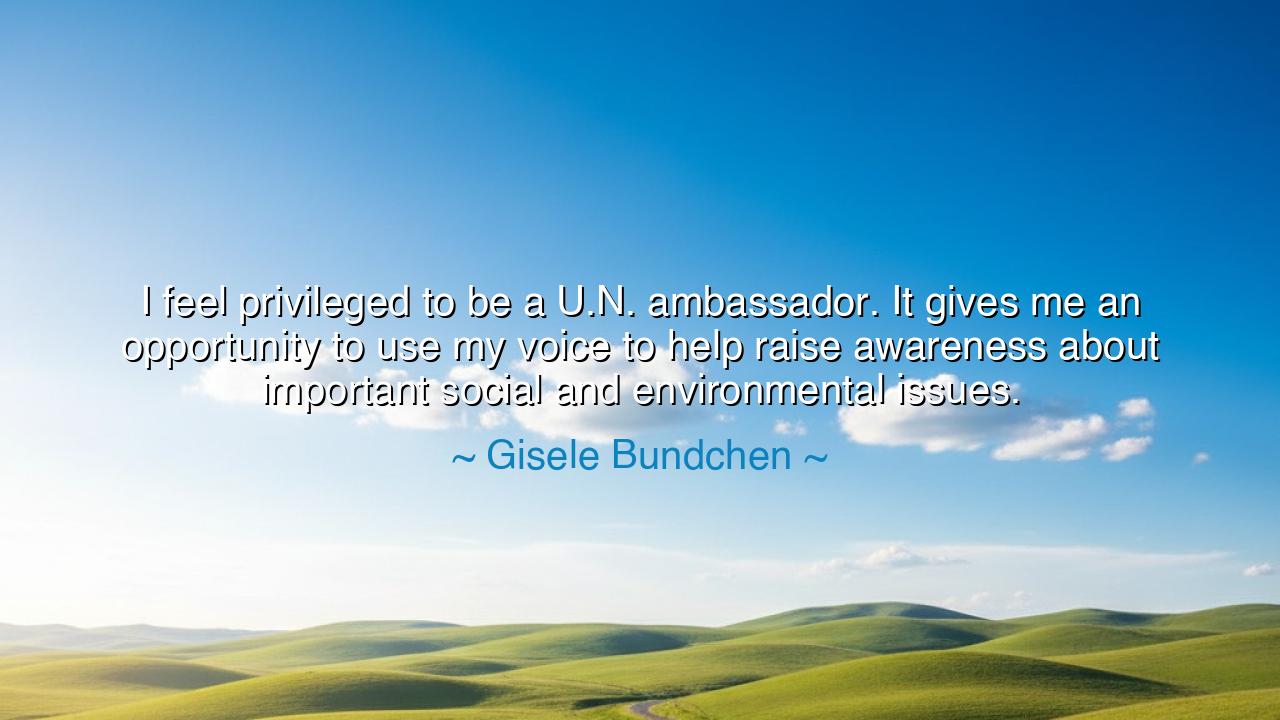
I feel privileged to be a U.N. ambassador. It gives me an
I feel privileged to be a U.N. ambassador. It gives me an opportunity to use my voice to help raise awareness about important social and environmental issues.






Hear, O listener, the words of Gisele Bündchen, spoken not from the stage of fashion but from the altar of conscience: “I feel privileged to be a U.N. ambassador. It gives me an opportunity to use my voice to help raise awareness about important social and environmental issues.” These are not the words of vanity but of vocation, for she declares that true privilege lies not in fame or wealth, but in the chance to serve a greater good. Her voice, once used to charm audiences with beauty, she now lends to the defense of the earth and the upliftment of humanity.
The meaning of this saying lies in the recognition of voice as a sacred instrument. Not all are given the ears of nations, nor the power to speak before the world. Those who possess such influence hold a responsibility as great as any king’s or general’s. For words, spoken with clarity and conviction, can awaken the sleeping, stir the apathetic, and inspire movements that reshape destiny. By becoming a U.N. ambassador, Bündchen acknowledges that her voice is not her own alone—it is a channel for justice, a bridge between the powerful and the voiceless, the prosperous and the forgotten.
History bears witness to this truth. Consider Eleanor Roosevelt, who after her husband’s presidency became a delegate to the United Nations. With her influence, she helped craft the Universal Declaration of Human Rights, giving voice to the dignity of all peoples. She did not wield an army, yet her words carried the strength of a thousand swords, for they inspired hope across a war-torn world. In the same way, Bündchen’s role echoes this lineage: to stand before the world not for herself, but for those who have no platform—the forests, the rivers, the poor, the endangered.
Mark also the story of Wangari Maathai, the Kenyan woman who founded the Green Belt Movement. With nothing but her words and the gathering of women, she planted millions of trees across Africa, healed the soil, and empowered her people. Her voice was her weapon, her call to action her legacy. The Nobel Peace Prize was given to her not for conquest, but for her ability to awaken others. So too does Bündchen’s quote remind us: the privilege of influence must always be yoked to the burden of responsibility.
Mark this well, O listener: to speak is not enough, but to raise awareness is the beginning of all change. Awareness leads to compassion, compassion to action, and action to transformation. The social and environmental struggles of our time—climate change, poverty, deforestation, inequality—cannot be solved by silence. They demand heralds, ambassadors, and visionaries to carry their cause into the councils of nations and the hearts of ordinary people. Bündchen confesses gratitude not for her fame itself, but for its ability to serve as a beacon.
Let this be the lesson: in your own life, seek not only what you can gain, but what your voice can give. You may not stand in the halls of the United Nations, but you have circles of influence—your family, your community, your work. Use your words to uplift, to defend, to awaken. Speak for those who cannot: the child silenced by poverty, the forest cut without mercy, the sea choked with waste. Every voice that is raised for truth becomes part of a chorus that can move mountains.
Therefore, O child of tomorrow, embrace the privilege of responsibility. Do not waste your speech on idle gossip or cruel words. Let your voice, however small it may seem, join the great song of justice and care for the earth. If you have a platform, use it. If you have an audience, even of one, teach them by your words and actions. For in truth, every voice matters, and silence is the ally of destruction.
Thus, Gisele Bündchen’s words shine as both gratitude and summons: to be an ambassador is a privilege, but to use one’s voice for the good of others is a duty. And in this duty, whether famous or unknown, lies the highest calling of humankind—to speak not only for oneself, but for the earth and all who depend upon it.






AAdministratorAdministrator
Welcome, honored guests. Please leave a comment, we will respond soon